|
It
is very likely that nearly every one has been very nearly certain that
something that is interesting is interesting them...
26
December — Friday (in San Diego)
§
Finding Nemo
| Dir. Andrew Stanton and Lee Unkrich, 2003 | VHS 100min | IMDb link
25 December
— Thursday (in San Diego)
§
Manhattan | Dir. Woody Allen,
1979 | VHS 96min | IMDb link

16 December
— Tuesday
§
To Catch a Thief | Dir. Alfred Hitchcock,
1955 | VHS 106min | IMDb link
Cary
Grant (as John Robie) to Grace Kelly (as Frances Stevens): "You
know, I have about the same interest in jewelry that I have in politics,
horse racing, modern poetry, or women who need weird excitement—none."
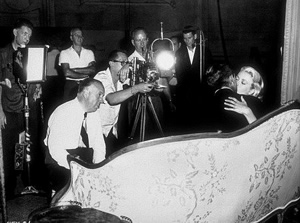
First Half
of December
§
Scattered impressions
FILM
| I took in an afternoon screening of Fellini's 8
1/2, which I hadn't seen for years. Because I have an irrational
devotion to the image Marcello Mastroianni cut in this period, I hardly
resented the many long lamely conceived passages Fellini permitted himself.
Of current releases, Love, Actually couldn't
keep up with its plot lines and mostly failed to be likable or memorable,
though it obviously was straining for the former rather desperately,
while Something's Gotta Give had some marvelous
comedic moments, the bulk of them involving Nicholson's working of his
wreck of a physique. • READING
| A bracingly mean stretch of Flaubert's letters, followed by several
days of reading in Woolf's letters and diaries between 1915-1920. •
BLOGS | Hotel Point,
S/FJ, and the infrequently
updated Harlequin Knights
kept me interested in this phase of generalized blog fatigue. •
MUSIC | The Emerson String Quartet's three-disk
set of Beethoven's late quartets, which I won't degrade with an adjective.
Also, a Norah Jones sampler compiled for me by a student and Odetta's
Christmas spirituals.
1 December
— Monday
§
Jean Frémon | Island of the Dead |
Trans. Cole Swensen | Kobenhavn & Los Angeles: Green Integer, 2003
| 281pp | $12.95
A
book that winks at the necessity of plot—its unnamed narrator has
at the outset lost a love to a rival, and he'll happens upon another
love in due course—while reserving its true energy, its mania one
is tempted to call it, for the non-narrative compilation of facts drawn
from various discourses (genetics, zoology, subterranean poetry lore
pertaining to John Barton Wolgamot....). This is a book in "bits,"
where bodies of knowledge are spoken—with no noticeable desire
to "naturalize" the performances—by characters who swerve
into the narrator's ken as chance and the contingent logic of "collections"
(museums, encyclopedias, friendships, gardens) insist. •
"In the face of the infinity of the world, we're all more or less
idiots. A few islands of aptitude here and there. Getting carried away
by detail. The part for the whole. The plague of generalized ideas!
It's the taste for the concrete, the taste for the form that makes the
naturalist. We must grasp the world in its actual forms, resisting conclusions,
expanding our collections, multiplying our examples. Each morning, take
up the portrait again as if it were a stranger's. The portrait of the
world" (239).
24 November
— Monday
§
Henry James | The Ambassadors | 1903 | Garden
City: Doubleday Anchor, 1958
Begun
in late summer and taken up thereafter as time and the mindfulness required
of one by Jamesian syntax presented itself. I was quizzing myself as
to whether I liked or understood the book well into its second half,
but at some point the quibbles ceased and something like "suspense"
took over. • "Did he live in a
false world, a world that had grown simply to suit him, and was his
present slight irritation—in the face, now, of Jim's silence in
particular—but the alarm of the vain thing menaced by the touch
of the real? Was this contribution of the real possibly the mission
of the Pococks?—had they come to make the work of observation,
as he had practiced observation, crack and crumble, and to reduce
Chad to the plain terms in which honest minds could deal with him? Had
they come in short to be sane where Strether was destined to feel that
he himself had only been silly? He glanced at such a contingency, but
it failed to hold him long...." (276).
21 November
— Friday
§
Wild Strawberries
(Smultronstället) | Dir. Ingmar Bergman,
1957 | 91min | Screened in the Devil's Eye Film Series, curated by Justin
Andrews at UMaine | IMDb link
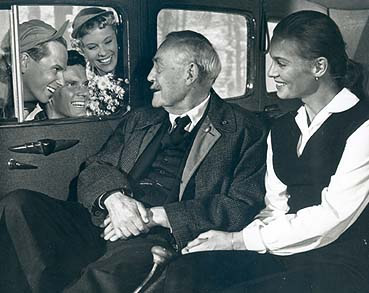
15 November
— Saturday
§
The Italian Job
| Dir. Peter Collinson, 1969 | DVD 99min | IMDb link

14 November
— Friday
§
The Gleaners and I | Dir. Agnes Varda, 2000
| Screened in the Devil's Eye Film Series, curated by Justin Andrews at
UMaine | DVD 82min | IMDb link
| stills
 
10 November
— Monday (en route from Tucson to Boston)
§
Laura Kipnis | "The Domestic Gulag" | Excerpt from Against
Love: A Polemic | Harper's | October 2003 | 15-18
The price
at which "love is obtained": "You can't analyze the cinematography
in a movie that they were emotional about.... You can't say the wrong
thing, even in situations where there's no right thing to say. You can't
use the 'wrong tone of voice,' and you can't deny the wrong-tone-of-voice
accusation when it's made. You can't repeat yourself, you can't be overly
dramatic.... You can't begin a sentence 'You always.' You can't begin
a sentence 'I never.' You can't be simplistic, even when things are
simple. You're not permitted to employ the Socratic method in an argument."
• As the last example demonstrates,
lots of things Kipnis associates with the prisonhouse of coupledom in
this pretty funny prelude to her book are forbidden to all non-obnoxious
people, including single ones.
7 November
— Friday
§
Headed to
Tucson and the conversation of the kind folks at POG.
29 October
— Wednesday
§
Suzanne Goldenberg
| "Up to 15,000 people killed in invasion, claims thinktank"
| Gaurdian | 29 October
2003 | link
§
Poetry Blogs — some updates since Sunday
Harlequin
Knights on Van Sant's Elephant. •
Overlap on a performance
of John Cage's "Music for Carillon" and the weekend's reading
by Corinna Copp & Nick Piombino. • Permalinkless Hotel
Point on Bob Perelman's essay "Polemic Greeting to the Inhabitants
of Utopia." • William
Watkins alternates between ecstasy
and Agamben.
• Lime
Tree's blog of the week, Mikarrhea,
involuntarily contemplates civil
war. • Sorter
exits, Ululations takes a
(mystique regenerating?) break. • SDPG
on the genesis
of Tao Drops, I Change. • Gila
Monster is listening to OutKast too. • CorpsePoetics
on kari edwards's iduna.
• Never Neutral
unveils the first installment of an essay on mourning
and storytelling. • Tympan
on the bleary-eyed camaraderie
of the academic job searchers. • And Philly
Sound checks out what
poets are reading.
26
October — Sunday
§
Poetry Blogs — from
the Third Factory links page
Allodox
catches a Parliamentarian acting Rothschildian (as in Douglas).
• A long post laying out arguments against the death penalty on
Bemsha
Swing. • Bloggedy
Blog Blog shares the results of a work satisfaction survey. •
Brutal
Kittens wander lonely as clouds. • Cahiers
de Corey defers to Marx and Silliman on questions of poetry &
empire. • CorpsePoetics
salivates over kari edwards's new work. • Elsewhere
is riveted by (to?) Marjane Satrapi's graphic memoir Persepolis—and
the prescient F train crowd concurs. • Equanimity's
magic lantern: "I remember being angry that I wasn't in the pictures
from before I was born." • Fait
Accompli points to a blog I've not seen before, Crag
Hill's poetry scorecard, where the question of how to create new
readers of poetry is being examined: "Build the next generation
of readers one reader at a time through your own individual work, yes,
but also through your own social interactions with younger, unaligned
readers." • One of the last acts before Free
Space Comix drifted beyond signal range: the Denis
Roche bootleg. • Gila
Monster nominates Sean
Penn's hair for an Oscar (it wins my vote: see below).
• Harlequin Knights
looks up from In
Writing to see LA
in flames. • Heathens
in Heat, dormant since 3 September 2003, remains in my mind as the
definitive blog of the "early phase": whereas others stumbled
into the blog format as into a darkened room to which their eyes took
a minute to adjust, Hess had the air of someone who'd been waiting impatiently
for just this light to strike him. That he maxed out what is, in fact,
a pretty restricted form doesn't surprise me: that he found so much
to do with it before hitting that point, still does. • Shades of
gray and the poetics of cheese at HG.
• Hotel Point contemplates
Trevor Joyce and Pynchon (the permalinks are 404: look for Friday, 24
Oct). • Human Verb
gets ready to read
Toscano. • The
Ingredient cites Kant on the peculiar fate of human reason. •
Laurable helps Pinsky
celebrate his sixty-third birthday and points to Geoff
Nunberg's NPR take on the term "fascist." • "They
redirect free-floating negativity at me who sometime did me scan":
Wyatt at Lime
Tree. • Mexperimental
tracks truths back to "mere Applied Syntax." • The 2003
Monkey Awards are announced.
• Mosses from
an Old Manse is on hiatus while Peter Culley makes an
east coast reading tour. • Never
Neutral celebrates its six month anniversary with a Barthesian meditation
on rereading.
• Freshly returned to NYC from Maine,
Overlap wards off
a half-hearted mugging attempt—with his keyboard stand: "this
use of a musical instrument is in the tradition of the Japanese Shakuhachi
flute, which doubles as a weapon if you're in a pinch."
• Pantaloons pens
one for Alan
Davies. • Polis
is Eyes is revived by three good poetry readings, including one
by George Stanley—due to read here with Kevin Davies on Thursday.
• Spurred on in part by the Bloggedy work survey, Porthole
Redux serves
notice. • Possum
Pouch attends the Austin reading of James Koller and Stefan Hyner.
• At Random
Items, an account of how the Monkey awards are playing in Germany.
• Heat wave in SF, firestorm in OC, but in Orono the firsts snow
fell on Wednesday (a fair amount but it didn't stick): Reading
& Writing has similar conditions. • Nearly as good as updates:
excuses for not updating, as at Ruminate
("composing a vast ode to my vasectomy"). • SPDG
takes up a cry recently heard also on Fait Accompli: "Vive La Perruque."
• The
Skeptic rolls up his sleeves to read Fictions
from the Self by Michael Burkard. • A
Sorter tarries
(cost of the war at time of site visit: about $82b). • Silliman
responds
to Bill Lavender's response to Silliman's reading of Another
South. • Squish
at a small press fair. • Tex
Files logs birthday greetings while listening to Continuous
Peasant and reading Merrill and Bachelard. • Thisbe's last
post remains the Dylan number of 3
August. • Tympan counsels the bloggers to bring their academically-hatched
format back
home. • Ululation's "The
Abuse of Mercury" post has the blogvertisements in quite a
state: to the left, "Flatulence/Gas Deodorizer"; to the right,
"Free Rectal Bleeding Info." • Venepoetics continues
with the
case against Chavez. • The
Well-Nourished Moon on impossible
goals and hybrid
emotions. • And ?
informs me of the existence of a comic book arm to OuLiPo: OuBaPo.
25 October
— Saturday
§
Marcel Proust | Swann's Way. | Trans. Lydia
Davis | New York: Viking, 2003 | 468pp | $27.95 | see earlier mention
below
Within
a few pages it is clear that Davis inhabits the Proustian syntax with
total confidence and from that point forward the book unfolds its familiar
scenes as though for the first time, every sentence an intricate duet
played through by two minds—Proust's, Davis's—upon which nothing
is lost. I'm only a hundred pages in, but already I find it hard not
to wish (with no disrespect to the other translators intended) that
Davis had been—convinced? permitted? forced by the Supreme Court?—to
bring the whole of the Search into English
herself. As it stands, the translation is a staggering act of generosity
and intelligence, a rejoining of two ways that—like the Guermantes
way and the one by Swann's—looked to be mutually exclusive: the
way by Beckett, through Davis, rejoins the way by Proust (and Joyce).
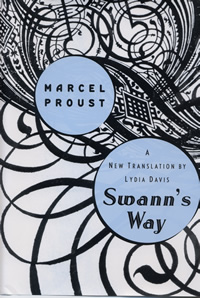
24 October
— Friday
§
Mystic River | Dir. Clint Eastwood, 2003 |
137min | IMDb link
As
advertised, good acting: especially from Tim Robbins. •
Blistered gobs of peeling paint everywhere. •
Penn's thick hair (dyed black with white streaks at the side) and clenched,
overly articulated face. • Laura Linney's
Annabeth Markum: her contempt for weakness, her stomach-turning eroticization
of patriarchal violence. • The Savage
Brothers, Val and Nick: the body type and sense of style one sees everyday
between Boston and Providence. • Eli
Wallach, in his late eighties, relishing his (uncredited) role as a liquor
store owner. • A boot to the face late
in the film that speaks to the constraint Eastwood has shown up to that
point. • Ed O'Keefe's sexually abusive
priest: little more than a face leering from the front seat, but it sticks.
• A moment where the music underscores
a scene just the way the Law & Order t.v.
franchise does: a slip, not an allusion. •
As Kent Jones noticed: the parallel editing almost quaint. •
Jenny O'Hara, also uncredited, as the mother of the Romeo figure (Brendan
Harris, played by Tom Guiry): the audience lurches between a gasp and
a laugh as she fills a doorframe, fierce and vast in her housecoat and
hair and willingness to disavow any feeling for her son. •
Leaving the theater, a young woman to her date, a bit disappointed: "It
was a thinking movie...." • Jonathan
Rosenbaum's review
for the Chicago Reader gets what's disgusting about the film better
than anything else I've read. His conclusion: "Is
this tragic inevitability or misogyny? Or is it maybe some of both, with
redemptive love and the equivalent of operatic arias thrown in as validation?
Whatever it is, it's the American way, and Eastwood has been elected its
official commentator. Maybe he's telling us we're wrong even when we're
right, but he's made it too easy to read that message in reverse."
• By contrast, see Kent Jones's
more or less canonizing response annotated below.
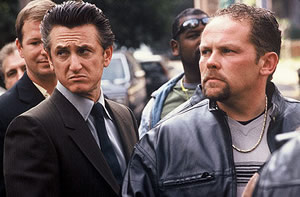
21 October
— Tuesday
§
Bernadette Mayer | "Journal Entry in Orono, Maine" | late March
2001 | link to 1.4mb Quicktime file
20 October
— Monday
§
Slam | Dir. Marc Levin, 1998 | DVD 100min
| IMDb link
This past
spring in Madison I heard Adelaide Morris give an interesting talk about
the scene in this film where Saul Williams, about to be jumped by fellow
prisoners, lets loose his "amethyst rock" rap and stuns his
stalkers into letting him leave the scene unharmed and unaligned (the
Bonz Malone character rubs his chin and mumbles: "I forgot what
the fuck I was thinking"). I can't disagree with the reviewer at
Salon
who writes of this scene: "It's a nice thought, but if victims
could 'word' their way out of trouble, Federico Garca Lorca would not
have been shot, nor Euripides exiled, and the disarmingly articulate
Joan of Arc might have eluded her public barbecuing at the stake."
But neither would I dismiss the wish articulated here: namely, that
words can astonish even to the point of breaking the spell of (spill
of) violence. • More from Salon:
"The majority of the characters in the jail scenes are real-life
inmates, and they often upstage the actors. Williams has the gentle
face and ascetic physique of a street poet, but he has a narrow emotional
range: He vaults from spaced-out confusion to wild gesticulations of
wrath and wisdom, with nary a nuance in between. His formal enunciation
also sounds alien next to the patois of his ghetto and jail constituency.
Particularly compelling is prison-gang leader Hopha (Malone) who squints,
slurs, snarls and struts across the celluloid with singular attitude.
Sohn, who plays the creative writing teacher with a sordid, mysterious
past, also reaches a depth in her jail scenes that she never attains
on the 'outside.'
In her farewell speech to her poetry students, she conveys a complex
stew of grief, love, hope, rage and generosity."
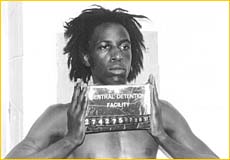
19 October
— Sunday
§
Lost Highway | Dir. David Lynch, 1997 | DVD
135min | IMDb link
Jonathan
Rosenbaum, writing in the Chicago
Reader when the film was first released: "Properly speaking,
this isn't a movie with characters but with figures, each of them as
overblown as a plastic inner tube. (The huge close-ups of eyes and lips
that periodically blip through the narrative only add to the overall
sense of abstraction.) .... The thrill of this kind of enigmatic rhyming
structure, combined with Lynch's masterful and often powerful fusions
of sound and image, is that it makes all sorts of splashy expressionistic
effects possible — moments of "pure" filmmaking in which
the ideological trappings of noir become subverted by the heady mixtures
(such as the literal and figurative grafting of the Mystery Man onto
the body of Arquette). The limitation is that, even if the thematic
preoccupations at times appear to float and circulate independent of
the inner tubes, their assumptions remain mired in the adolescent mind-set
('dirty' sex and corrupted male innocence) that informs virtually all
of Lynch's features." • From Janet
Maslin's review:
"When Fred, a musician, goes out to play at a jazz club, Renee
says she will stay home and read. No heroine of Mr. Lynch's has ever
looked ready to curl up with a good book."

18 October
— Saturday
§
Bowling for Columbine | Dir. Michael Moore,
2002 | DVD 120min | IMDb link

§
In the air — André Benjamin / OutKast | The
Love Below | Arista 2003 | 20 tracks 78min
Dorian
Lynskey, writing for the Gaurdian:
"Hopping boundaries like Prince in his prime, Benjamin alights
upon absurd innuendo ("Lend me some sugar! I am your neighbour!"),
Norah Jones, a drum'n'bass version of Rodgers and Hammerstein's 'My
Favourite Things' and a song called 'Dracula's
Wedding,' which really is about Nosferatu's nuptials." • Pitchfork's
Brent DiCrescenzo argues the minority position that Big Boi's Speakboxx
is the better of the two discs: "As it turns
out, [Benjamin's] Prince-mimicking fusion looks a lot better on paper
than it sounds in your ears. On too many songs, Andre repeats space-playboy
choruses over repetitious, unfinished digifunk. As the brief orchestrated
outro to 'Pink and Blue' suggests, each track feels like it's missing
something—strings, guitars, harmonies, organic instruments, and,
oh right, Big Boi. Andre does have his moment, though: 'Hey Ya' glitters
and towers like the silver Westin hotel over an 80s Atlanta skyline,
blending Flaming Lips-like synth-bass and ebullient acoustic guitar
with the rebellious joy of 'Little Red Corvette'—and like all classic
songs, it introduces new vernacular with a genius that transcends product
placement. Even indymedia.org feeders will shout 'Polaroid!' while miming
spanking at this fall's Not-Dog cookouts."
17 October
— Friday
§
Kent Jones | "The Eastwood Variations"
| Film Comment | September / October 2003 | 44-51
"Since
the late Eighties, Eastwood has offered the same contrast to the audience,
again and again, in myriad variations: this is the way you think
things are, the way you're told they are, and this is the way
things really are. Which is, of course, what the narratives of
Bird, Madison County, Unforgiven, A Perfect World (great
title), and Mystic River—Eastwood's crowning achievements—are
all about. I think his detractors hold it against him, because they
think it all boils down to slam-bang melodrama, every move culled from
the most surefire formulae in the action-movie handbook (parallel editing,
boldfaced contrasts, sensationalist injections of realism). And they're
not exactly wrong. But Eastwood is harnessing these devices to think,
and to help us think, through questions of violence, vengeance, adulthood,
and social conditioning—amazing that this alleged arch-conservative
has made movie after movie devoted to the idea that criminals are just
ordinary people who've gotten bad breaks.... His older films are admirably
restrained, often refreshingly bitter, with a nice, adult gravitation
toward solitude, best exemplified by William Holden's genuinely misanthropic
bachelor in Breezy (73)—in those days,
Eastwood himself was still a little too callow to pull off the loner
effect as perfectly as Holden: he had to wait for his skin to weather
and his eyes to crinkle into slits" (51).
§
Scenes from The Independence of Eddie Rose
| Play by William S. Yellow Robe, Jr. | Performed by the Penobscot Players
at the University of Maine
§
Charles Bernstein | "PENNsound Manifesto" | link
(with thanks to Laurable
for the pointer)
06 October
— Monday
§
Kodwo Eshun | "Cross Platform: Sound in Other Media" | The
Wire 235 | September 2003 | print edition only
Among the
music blogs mentioned in Eshun's one-page rundown of the scene are:
minima moralia,
S/FJ, New
York London Paris Munich, FreakyTrigger,
skykicking, The
Church of Me, The Pill
Box, k-punk, tHAT
wAS a nAUGHTY bIT oF cRAP, and Heronbone.
Of the latter, Eshun enthuses: "Equally at home with the oeuvre
of Dizzee Rascal and Fernando Pessoa, Heronbone is deeply original.
Music magazines cannot prepare you for the sheer surprise of a blog
that locates itself between WG Sebald, Wiley from Roll Deep and Iain
Sinclair. From word to phrase, clause to lyric, sentence to paragraph,
Heronbone is sheer greatness: a vivid justification of the blog at its
best and brightest." That someone can write "best and brightest"
without apparent irony is worrisome, and the hyperbolic tone creates
expectations that I at least don't expect to see fulfilled by a blog,
but I'm curious to visit this and other recommended sites over the next
few days. For one thing, I like seeing other people wearing the prefab
blog formats that I associate with particular poetry bloggers: it's
as though blogspot-era Lime Tree "is" The Pill Box for a moment
and the little worlds temporarily dilate.
04 October
— Saturday
§
Bookforum 10.3 | Fall 2003 | Print edition | Link to table of contents
here
At a first
pass: "A Day in the Life" of Pier Paolo Pasolini, just before
he made Accattone: "On the road we
talked and talked. Finally, we could discuss freely, without arguing,
more clearly and innocently than in all the literary reviews we had
been asked to write in the recent months, with the joyfulness of helping
each other to understand" (16). • Heather Caldwell reviews
Jerome Rothenberg's edition of María Sabina's mushroom chants:
"In a sense the mushrooms offered her a way into language: Her
words literally healed the sick, consoled the sad, and inspired the
aimless. As she herself attests, 'I cure with Language. Nothing else'"
(46). • Saul Anton lets Lydia Davis talk about her Proust translation:
"It seems to me that Proust's idea of the sentence is that it is
one extended thought, with or without ramifications, a web or net thrown
over an idea; of course, that's not a very good metaphor because the
web or net itself is the idea. He felt the sentence must not be broken,
interrupted.... He felt that his work was 'concise,' and I agree with
him. One can have extended works of literature that are economical and
short works that are verbose" (36). • Erik Davis briefly reviews
Zizek's book on "the perverse core of Christianity," The
Puppet and the Dwarf. • And Michael Silverstein manages
to say nearly nothing about the new edition of The
Chicago Manual of Style.
03 October
— Friday
§
Lost in Translation | Dir. Sofia Coppola,
2003 | 102min | IMDb link
From Liam
Lacey's review
in The Globe and Mail: "Arguably, Lost
in Translation is the American answer to Wong Kar-wai's masterpiece,
In the Mood for Love, though less about
history, more about infatuation. Lost in Translation
is already earning swoony critical responses. Once again, we have the
teasing possibilities between a man and a woman, both attached to other
people yet intensely drawn to each other. Both are unwilling to do wrong
and, in the end, each movie gains mystique from a secret that is whispered,
to which the audience is not privy.... If it were clear that Coppola
was showing the heartless side of mutual infatuation, this might be
a deeper film, not just a study of attraction in isolation. The dizzy
high of an improbable romantic connection is perfectly captured; the
sour notes seem to have seeped in unawares." • Note how terrifically
lumpy Scarlett Johansson is allowed to be in the still below: so unlike
the überhip still with the pink wig. • Read Allodox's
take back on 16
September.

nb archive —
current
June
1-15, 2003 • June 16-30, 2003
July
1-15, 2003 • July 16-31, 2003
August
2003 • September 2003
back
to ensemble • back to index
|


